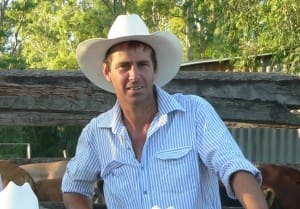WITH confirmation yesterday that Andrew Ogilvie will not be seeking a further term as Cattle Council of Australia president later this year, who is likely to replace him?
One name that has been bandied about behind the scenes in recent months has been that of AgForce Queensland cattle board president Howard Smith.
When Beef Central phoned yesterday to ask if he is considering throwing his hat into the ring at next month’s AGM, he confirmed he had been approached to do so, and was “seriously thinking about it”.
“If anyone else wants to stand up, well, they’re welcome to as well,” he said.
“But I just thought that with the restructure and things that are happening, we are at a pivotal moment for some constructive change and hopefully we can go forward from there.”
Mr Smith is a cattle producer from Rolleston in Central Queensland, where he, his parents and three brothers and their families run five properties producing a variety of crops and breeding, fattening and trading cattle.
His nomination for CCA presidency will follow ten years in cattle industry leadership positions.
He was first elected to the AgForce cattle council in 2004, and then became one of Queensland’s representatives on the board of Cattle Council of Australia a few years later. He has been the president of the AgForce cattle board for the past two years.
Time of uncertainty for CCA
Whoever does take over the CCA presidency at its AGM in Sydney next month, they will be taking the helm at a time of unprecedented uncertainty for the organisation.
On one hand Cattle Council is trying to move forward on a still limited operating budget under a new and streamlined structure introduced in January.
The new look Cattle Council now has much smaller board of just eight seats, soon to expand to ten when two new independent board members are elected for the first time at its AGM next month.
Cattle Council also now provides a direct membership pathway so producers who are not members of State Farm Organisations can still join and contribute to national industry debate and policy making.
The restructure has also involved the introduction of four new consultative committees which allows the peak grassfed industry council to harness greater industry-wide expertise to inform its decision making in the key areas of marketing, R&D, industry systems and animal welfare.
On the other hand, CCA’s future is also now largely in the hands of the Federal Government, following the recent Senate Inquiry into grassfed beef levies and systems, and more specifically in the hands of federal agriculture minister Barnaby Joyce.
The Senate committee recommended that a producer-owned and controlled body be established by legislation to take full control of the $50m in grassfed levies producers pay each year, and to take over the responsibility of apportioning those funds to marketing and R&D projects for the benefit of industry.
If adopted, that recommendation would have significant implications for the future of both CCA and the levy-funded service provider MLA, which is also undergoing a self-driven restructure process initiated during the recent senate inquiry.
Mr Joyce is yet to show his hand and indicate whether the Government will act on the committee’s recommendations, but his decisions will have a large bearing on how both CCA and MLA take shape in the future.
Funding crunch
In the meantime CCA is facing a serious looming funding crunch.
It currently relies on funding from a service agreement with MLA to fund the costs of running its new consultative committees.
CCA’s decision to take money from the levy-funded service-provider MLA in return for providing consultation services has been criticised by some as the ‘master taking money from the servant’. CCA says the funding it receives from MLA pays for important work that benefits the entire industry and does not compromise its ability to independently manage how MLA spends grassfed levies.
The current funding agreement between CCA and MLA cuts out in December. It is not yet clear if CCA and MLA will be renegotiate a new Service Agreement, but, under existing arrangements, CCA may have to find a new way in a tight operating budget to fund the work of its consultative committees in 2015.
Council ‘just has to get on with the job’
Mr Smith acknowledges that CCA is facing an uncertain time as it awaits decisions beyond its control on industry structures and whether its own resourcing will be boosted via direct levy funding in future.
In the meantime, he says, the council just has to get on with the job. “Just like selling a house, you don’t know when or if a buyer will come, but you still have to keep everything maintained and running as smoothly as you can.”
In his view, the peak industry council representing grassfed producers has to be better-resourced to enable it to be proactive and effective.
Operating on a shoestring budget of just $1.3m with four to five staff has too often meant reeling from one problem to the next without getting on the front foot.
“We all want to be more proactive, but when you’re operating on limited resourcing you’re always putting your fingers in the dyke blocking holes.
“I would like to have a well resourced peak council that can be out there and be more proactive and advocate and still have those resources to do the day to day work that needs to be done.
‘We have to get back to delivering something tangible back to the grassfed levy payer’
“We have got to get back to delivering and getting something tangible back to the grassfed levy payer.”
Mr Smith says that by nature a lot of the work CCA does occurs behind closed doors and out of sight to the broader industry.
He admits to being irritated by claims that industry representatives have their “snouts in the trough”.
In reality, he says, representatives give their time and don’t get paid.
“I do get annoyed when people say their industry representatives have their snouts in the trough. That couldn’t be further from the truth.
“You get expenses covered but not sitting fees. Your business does suffer and you virtually have to put someone on at home to cover your absence.”
So why do it?
Mr Smith says he continues to be involved in industry representation for the same reason he got involved in the first place.
Like many other producers, he had strong views and pre-conceived ideas about how things should be done.
His wife Gail, a local Government councillor, told him there was no point from a sitting position throwing rocks. Might as well get in and have a go.
So he did.
Several years later, he says he has a more realistic understanding of what it takes to effect change.
“I see people coming in now similar to how I came in. You think everything is black and white until you get in there, and ‘why can’t this be done’?”
“I suppose when you really look at it, if it was that simple they would have done it.
“But change takes a long time in agriculture.
“PCAS was one issue that I was involved in pretty heavily. It was instigated before I got there, and that took seven years, we got that over the line and that has been an excellent result for industry, it elevated our grassfed product and got a premium for it.
“Those sort of things are why you stay there.
“There is plenty left to do there, and it is good to see we have people who are passionate coming along to take more of these issues forward.”
Future looking good
From his vantage-point in the industry, he is confident the stars are finally lining up this time.
A rising Asian middle class that is prepared to pay for quality product, and the fact that global demand is now starting to outstrip global supply, has put Australia’s beef industry ‘in a pretty good space’.
Producers have to get through this period of drought first, and will need a reasonable run of years to regroup, given the damage that has been done, he said.
But importantly the industry was already starting to see significant prices and “there is a fair bit more in it yet”.
Improving farm-gate returns
Mr Smith says the focus at industry level must remain on getting a greater share of the value of beef back to the farm gate.
“PCAS and MSA and a few of these things are really taking the industry forward and we are getting away from just having a commodity.
“We want to differentiate our product and get a premium for it.
“That is what I am focused on. I believe we have a pretty good product and at the end of the day we want our product to be appreciated and paid accordingly.”
Mr Smith said there was a lot of work left to do in the area of industry specifications and grading systems to improve the relevance to eating quality.
Achieving greater efficiencies in the processing sector, particularly through the development of automation technology, also required greater attention.
“Producers have had to adjust to become more efficient and I think the processing sector is moving that way, but I think we can get some big gains there in automation, there are some exciting things happening there now.”
Profitability before productivity
He also disagrees with the industry and government mantra that says the industry should focus on “productivity” and doubling production by a certain date.
“Focus on improving returns at the farm gate,” he says, “and productivity will take care of itself.”
“People have to get away from this idea of doubling production. To me that is absolute BS. We just want to get paid more for what we have got now.
“Don’t worry about production. If there is enough money at the other end, people will increase production.”
“The last thing you want is too much supply and you can’t market it all.”


